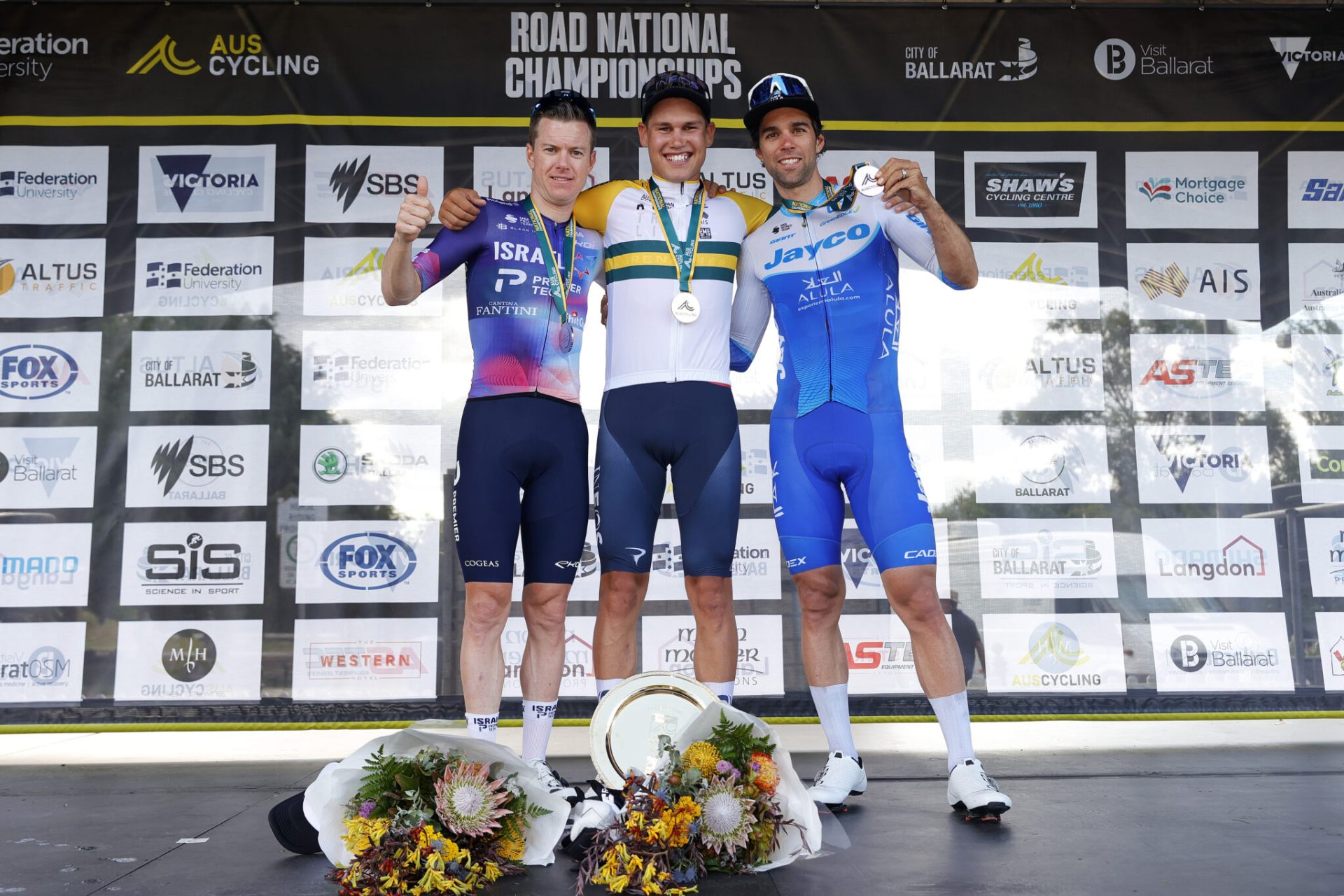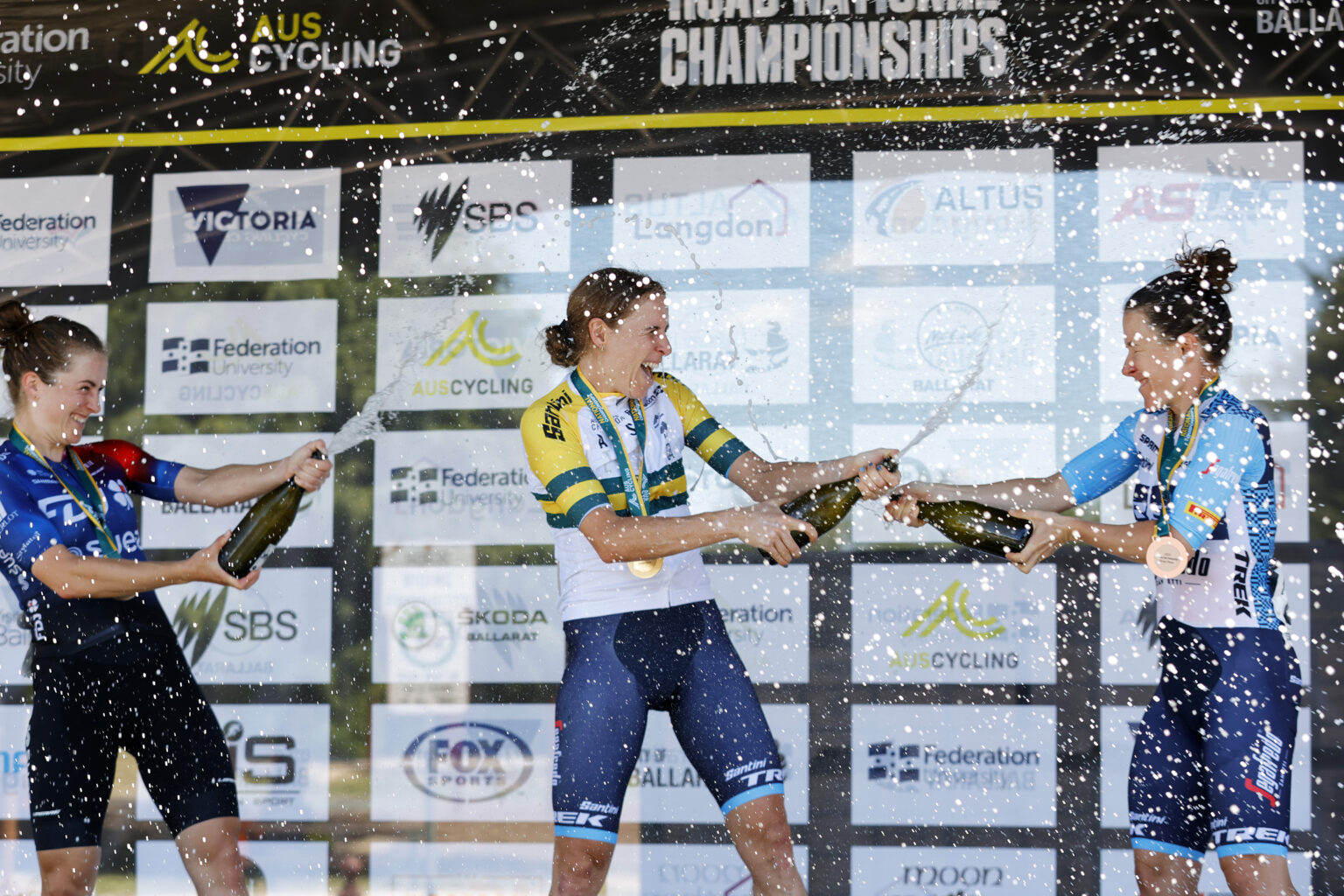A big change is on the horizon for one of Australia’s biggest cycling events. In early 2025, the Australian Road National Championships will be uprooted from their long-time home of Ballarat, Victoria and moved around the country.
That’s welcome news for anyone (riders included) who have long been tired of the same Mt. Buninyong course that’s been used in the road races for years now. In fact, the Ballarat/Buninyong region has hosted all but two editions of the Road National Championships since 2002 (the 2005 and 2006 editions were held in the Adelaide Hills).
So why, after so long in Ballarat, is the event finally moving? AusCycling’s executive general manager of sport, Kipp Kaufmman, says there are a few reasons.
“The changeover to AusCycling [from Cycling Australia – the previous incarnation of the sport’s national governing body – ed.] has obviously made the organisation bigger, and more, I guess, national in its approach,” Kaufmann told Escape Collective. “We obviously look at the sport a little bit differently in terms of all of the disciplines and how we can grow them all.
“Ballarat’s been awesome. But I guess we looked at it strategically of what we could do and how we could grow not only the event, but the sport as a whole. And that led us and our board to an outcome which was: we would start to move the event around.”
Kaufmann explained that Nationals won’t move every year – the goal is for it to spend three years in a given location before moving on. And while the event is departing Ballarat after one final edition in 2024, it will likely be back.
“This is not a forever, ‘see you later, Ballarat,’” Kaufmann said. “It is [our] intention to continue to work with them to come back as one of the host communities as we move forward.”

AusCycling (and Cycling Australia before it) has long been interested in moving the Road Nationals around the country. But while other locations have been considered over the years, none was ultimately deemed as suitable (or had the same financial resources) as Ballarat.
But given AusCycling’s announcement in July that Nationals will now leave Ballarat, it would appear that another viable host – or indeed hosts – has been found. So what’s changed?
“I think a few things have helped us,” Kaufmann said. “One, we were able to get through COVID – we actually pulled it off through those periods.”
Road Nationals was the only event on the Australian ‘Summer of Cycling’ calendar that wasn’t forced to cancel or pushed into substantial change by COVID-19. Several editions of the Cadel Evans Great Ocean Road Race and Jayco Herald Sun Tour were cancelled due to COVID, and the Santos Tour Down Under was forced to run a smaller, domestic-level event instead of its regular WorldTour offering.
“Whether that was through luck, or whatever it might have been, that we were able to pull those [editions of Nationals] off showed that our organisation has been strong through that period, and the event could continue to generate interest,” Kaufmann continued.
And there are other factors that, in Kaufmann’s eyes, make Nationals more appealing to potential hosts than it might have been previously.
“I think it’s continued to build as an event through the broadcast lens, which makes it more valuable,” he said. When asked for more detail, Kaufmann said that viewer numbers of the event have increased in recent years, by virtue of GCN covering the event internationally, plus the added broadcast of the U23 men’s race and the addition of post-day recap shows.
Kaufmann said that the growth of the championships, in terms of the number of race categories, has helped it become more appealing too.
“Not many years ago, you may recall when it was just the U23 and elite championships generally,” he said. “I think what’s really helped boost it is the paracycling elements, the club elements, there’s some masters elements … the participation elements.”
Making Nationals bigger in terms of the number of events and race categories means more people in town, more room nights for accommodation providers, more customers at restaurants and other businesses, and so on. And growing the TV audience for Nationals means more eyeballs on the host location which can also assist with the region’s tourism goals. All of these factors are a selling point for any would-be host location.
But even still, finding a suitable host for Road Nationals is complex.
Part of the process, of course, is about finding good courses, particularly for the road races.
“I think we learned a lot in Wollongong [the 2022 Road World Championships – ed.], at least I did,” Kaufmann said. “We always knew there would be a lot of good elements to the course. And while we started to design it, it had to take a while to really work that through. I think we take a lot more time now and make sure that, especially for the road race, that there is a course that can be delivered and can be considered almost as iconic as Buninyong.
“That doesn’t mean it needs to be a climb course, just for anyone who wants to worry about that issue. But having a really good course and knowing how we could deliver it is an important element for us.”

A “really good course” doesn’t just refer to the sporting elements. It also needs to factor in how it will look on a TV broadcast, how the course will best attract roadside fans, and so on.
And of course, the course is just one part of the equation. A host city might have a perfect, ready-made course in mind, but if that city (and indeed its state government) doesn’t have the resources – not least the cash to pay for hosting the event – then it won’t work.
While not an international event, Nationals is still expensive to run. A bunch of roads need to be closed for several days, there are significant personnel costs to factor in, and much more besides. By way of context, the City of Ballarat spent $660,000 to host the 2024 edition of the Championships.
And there are other logistics to factor in. For instance, the host city needs to be big enough, with enough nearby accommodation, to house the several thousand people directly connected to the event, not to mention those that come along to watch. To the same end, if the host town isn’t a major population centre, it needs to be easily accessible by one (Ballarat is a 90-minute drive from Melbourne).
Indeed logistics is one of the reasons AusCycling is pushing for the championships to spend three years in each location before moving on. It takes time to iron out the creases when delivering any event in a new location.
“Road is probably one of the harder events to run, road races,” Kaufmann explained. “Making sure you do it right takes significant investment and time to get it perfect.”
A big part of spending three years in one place is about providing some amount of consistency, both for stakeholders and for fans.
“It’s building up that excitement from the fans,” Kaufmann said. “They know it’s on the calendar, [we have time] to build up that following, which has been so good in Ballarat. The other part is getting sponsors. Some can be national, obviously. But where we’ve been really successful is getting some of those local partners who bought into the event, really invested in it, and kind of owned it. I guess the other part as well is, government really likes to invest in something for several terms, rather than just a one-in-one-out type of approach.
“So I guess all those things, at the end, add to certainty. So certainty of delivery, so that whether it’s a good or bad year on one of the elements we know the others might stack up and we can deliver a great event each time.”

So if AusCycling is saying Nationals will move to a new home in 2025, does that mean a new location has been found and locked in? Given the national body’s reticence to move the event previously, it seems unlikely AusCycling would uproot Nationals without something already in place.
Kaufmann wouldn’t confirm whether that was the case.
“We do certainly get interest in major cycling events, and in particular on the road, all of the time,” he told Escape Collective. “So we have certainly been discussing with a number of potential partners over the last bit and we think there’s a couple of options that will hopefully come to fruition quite soon.
“I think we seek to announce before [the 2024] championships [who’s hosting in 2025]. And even hopefully starting to look at what that runway is. So if we know who’s next, who’s actually next after that, and potentially who’s after that.”
At least in theory, South-East Queensland is one possible region that could host the event in the coming years. Road racing has developed in the region in recent times, with the Oceania Road Championships being folded into the Tour de Brisbane for the past two editions, plus the creation of the Cycle Sunshine Coast National Road Series event in 2021.
And with Brisbane hosting the Summer Olympic Games in 2032, running the Australian Road Nationals in the region would provide a valuable opportunity to run test events and trial various course options in the lead-up.
Kaufmann agreed that South-East Queensland does have “a couple places that could certainly host the championships.”
“We have a great relationship with Queensland,” he said. “You can probably see that through the track, to the BMX World Cup and World Championships that are coming up there, in Tour de Brisbane, things like that, Oceania Championships. So we have an awesome relationship, and they’re obviously gearing up and preparing for the Olympics. And it’s probably helping us prep for the Olympics as well, both from a pathway perspective and event delivery perspective.
“I think they have a great opportunity to host but I don’t think it’s any bigger or better than anyone else.”
There are other reasons to think South-East Queensland could be a future host of Nationals. Several weeks before revealing that the event would move in 2025, AusCycling announced it had signed ARA Group as a major sponsor on a five-year deal, with the building services business becoming the naming sponsor of the Australian national team. Was ARA’s arrival the catalyst for a new, more-mobile future for Road Nationals?
ARA has sponsored the Queensland-based Australian Cycling Academy team (now racing at Continental level as ARA-Skip Capital) since 2019, and has strong links with the University of the Sunshine Coast. Perhaps ARA’s sponsorship of AusCycling involves Nationals moving to the Sunshine Coast (two hours north of Brisbane) with the University of the Sunshine Coast as an event sponsor (and possible course location), much the same way Federation University has supported and featured in the Ballarat Road Nationals?
At first glance, it certainly seems plausible. But Kaufmann was keen to play down that possibility.
“The ARA relationship is a great commercial relationship that we have [and] it’s particularly with the national team,” Kaufmann said. “They do get exposure with the national championships as a result, so that’s kind of one of the benefits. But certainly none of the sponsors are part of any of the decision-making of where the championships will go.”

In January next year, Ballarat will host its 18th Road Nationals in a row and its last for at least the time being. At some point before that, probably in December 2023, we’ll find out where the 2025 edition will be held, and likely the next few after that. Wherever Nationals ends up, Kaufmann is hopeful that a change of location will help with one of AusCycling’s biggest ongoing goals: growing cycling in Australia.
“Our hope is that it brings new fans who may have said ‘I can’t get to Ballarat in summer. I can’t do that at that time of year,’” Kaufmann said. “Bring some of those people, engage a new community. We see riders that come out of Ballarat and Victoria and other places as a result of the Road Nats being on there. So it helps that pathway and entrances and excitement into clubs.
“That’s really where we hope we can deliver more. We’ll continue to work more with the local community about getting kids on bikes as a lead-in to the championships. All of those things we think, hopefully add to building cycling as a whole.”
What did you think of this story?

